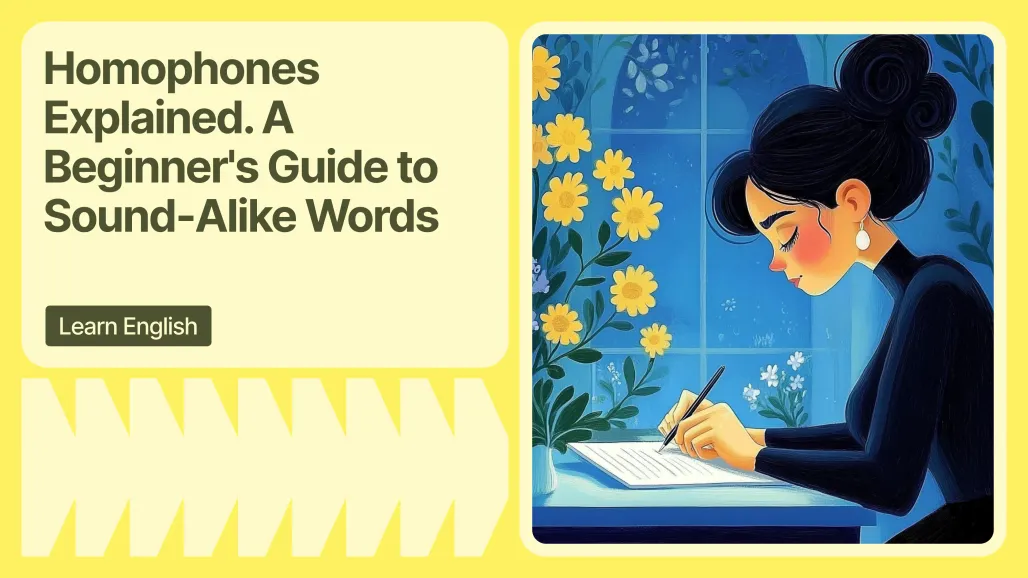Homophones Explained. A Beginner's Guide to Sound-Alike Words

Learn what homophones are and how to use them correctly, with 10+ fun examples of words that sound alike but mean different things.
What Are Homophones?
📋 Common Homophone Pairs & How to Use Them
Allowed / Aloud
Bare / Bear
Base / Bass
Berry / Bury
Cell / Sell
Flour / Flower
Knot / Not
Pair / Pear
Peace / Piece
Die / Dye
Do / Dew / Due
Flew / Flu / Flue
Ore / Oar / Or
Scent / Cent / Sent
Principle / Principal
Sow / Sew / So
Tail / Tale
Right / Write
Sun / Son
Brake / Break
Mail / Male
Meat / Meet
🧠 Why Do Homophones Matter?
📝 Tips for Remembering Homophones
Why They Sound the Same—but Mean Something Totally Different
What Are Homophones?
Have you ever come across a sentence and thought, “Hold on, is that the right word?” Maybe you saw “bare” instead of “bear”, or “peace” instead of “piece.” If so, you’ve already met a homophone!
Homophones are words that:
- Sound exactly the same
- Have different meanings
- And usually have different spellings
They are one of the trickiest parts of the English language, especially because the pronunciation doesn't help you figure out which word is correct.
And here’s the thing: whether you’re an ESL (English as a Second Language) student or a native English speaker, homophones can trip you up!
- ESL learners often struggle because English spelling rules aren’t always logical.
- Native speakers sometimes pause too, unsure whether to write “their,” “there,” or “they’re.”
Choosing the right homophone depends entirely on understanding context—what the sentence is really about.
Mastering homophones is like sharpening a secret tool in your language toolbox. It helps you:
- Write more clearly
- Understand more when reading
- Avoid funny (or embarrassing) mix-ups
So, if you’ve ever hesitated over which spelling to use—you’re definitely not alone. Let’s dive into some of the most common and confusing homophones and see how to master them!
📋 Common Homophone Pairs & How to Use Them
Here are some great examples of homophones, with a sentence to show each in action:
Allowed / Aloud
- You're allowed to go outside.
- Please read the story aloud.
Bare / Bear
- I walked with bare feet on the beach.
- A bear was spotted in the forest.
Base / Bass
- The runner made it to second base.
- She plays the bass guitar in a band.
Berry / Bury
- I picked a berry from the bush.
- They will bury the treasure under the tree.
Cell / Sell
- A prisoner lives in a cell.
- They want to sell their old car.
Flour / Flower
- We need more flour to bake cookies.
- That flower is blooming beautifully.
Knot / Not
- I tied the rope in a knot.
- I'm not going to the party.
Pair / Pear
- I bought a new pair of shoes.
- He ate a juicy pear for lunch.
Peace / Piece
- Let’s all live in peace.
- Can I have a piece of cake?
Die / Dye
- The flowers will die without water.
- She wants to dye her hair purple.
Do / Dew / Due
- Please do your homework.
- The morning dew sparkled on the grass.
- Your report is due tomorrow.
Flew / Flu / Flue
- The bird flew across the sky.
- I stayed home because I had the flu.
- Smoke rose up through the flue of the chimney.
Ore / Oar / Or
- The miners discovered gold ore.
- He rowed the boat with one oar.
- Would you like tea or coffee?
Scent / Cent / Sent
- I love the scent of fresh flowers.
- A penny is worth one cent.
- I sent the package yesterday.
Principle / Principal
- Honesty is an important principle.
- The principal welcomed us to the school.
Sow / Sew / So
- We will sow the seeds in spring.
- She learned how to sew her own dress.
- I’m tired, so I’ll take a nap.
Tail / Tale
- The dog wagged its tail.
- Grandma told me a magical tale.
Right / Write
- Turn right at the next street.
- I love to write stories in my journal.
Sun / Son
- The sun is shining brightly today.
- My son just started school this year.
Brake / Break
- Always brake slowly when driving in the rain.
- Be careful not to break that glass!
Mail / Male
- I got a letter in the mail this morning.
- The lion is a male with a big mane.
Meat / Meet
- We had roast meat for dinner.
- Let’s meet at the café around noon.
🧠 Why Do Homophones Matter?
Homophones are important because they teach us to:
- Listen carefully
- Pay attention to context
Even though the words sound the same, they mean different things—and using the wrong one can change your whole sentence!
They’re especially important for:
- Writers, who need to choose the right spelling
- Readers, who need to understand meaning from context
- Language learners, who are figuring out English’s quirks
📝 Tips for Remembering Homophones
- See them in action: Read lots of examples, like the ones above!
- Use mnemonics: For example, “You need flour to flower a cake” (silly but memorable!)
- Practice writing: Try making your own homophone sentences.
- Read aloud: Hearing them helps lock in the difference.